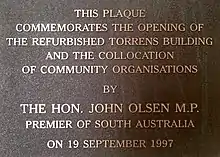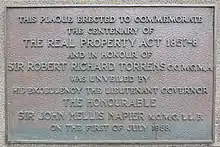Torrens Building
The Torrens Building, named after Sir Robert Richard Torrens, is a State Heritage-listed building on the corner of Victoria Square and Wakefield Street in Adelaide, South Australia. It was originally known as the New Government Offices, and after that a succession of names reflecting its tenants, including as New Public Offices, the Lands Titles Office, and Engineering & Water Supply Department. It has been home to a number of government departments for much of its existence, and it currently holds offices for the Commissioner for Public Sector Employment (OCPSE) as part of the Government of South Australia.
| Torrens Building | |
|---|---|
 | |
| Former names | Government Offices |
| General information | |
| Type | Office, Education |
| Architectural style | Italian Renaissance, Palladian |
| Location | Adelaide, Australia |
| Address | 220 Victoria Square/Tarndanyangga |
| Construction started | 1879 |
| Completed | 8 April 1881 |
| Renovated | 1997 |
| Cost | approx. £60,000 |
| Owner | Government of South Australia |
| Technical details | |
| Floor area | 3,653 square metres (39,320 sq ft) |
| Design and construction | |
| Architect(s) | Michael Egan (Melbourne) |
| Main contractor | James Shaw |
The construction of the building created some controversy in 1880 when it was reported that the Government of South Australia was going to import freestone for its construction from Sydney, rather than use stone from local quarries.
The building was heritage-listed in 1978 (Register of the National Estate) and 1981 (SA Heritage Register), and underwent a major renovation from 1993 until its reopening on 19 September 1997.[1]
It has housed the Australian campus of the Carnegie Mellon University since 2006 and Torrens University opened its first campus there in 2014. Cranfield University (UK) had a campus in the building from 2007 to 2010 and the University College London from 2009 to 2017.
History
.jpg.webp)
The building at 220 Victoria Square/Tarndanyangga was built in 1881 as public service offices, and initially known as the New Government Offices.[1] It created some controversy in 1880 when it was reported that the Government of South Australia was going to import freestone for construction from Sydney, rather than use stone from local quarries.[2]
For a long time it went by a number of names, such as New Public Offices, the Lands Titles Office, and Engineering Supply Department, after its main occupants.[1]
In 1979 it was renamed as the Torrens Building, after Sir Robert Richard Torrens and the system of lands title registration introduced by him to South Australia and the world, the Torrens title system.[1]
In 1993, after 112 years of continuous governmental occupation, the Torrens Building was closed for restoration. Since its reopening in 1997, it has become host to a number of Australian campuses of prestigious foreign universities.
Restoration and Renovation

From 1991[3] or 1993,[1] after over 110 years of continuous governmental occupation, the building was closed and major refurbishment undertaken.[3]
After its reopening by then Premier of South Australia, John Olsen, on 19 September 1997,[1] the building was used to accommodate a number of community groups and organisations including Amnesty International (S.A. & N.T. Branch), the Amputee Association of South Australia, and the United Nations Association of Australia (S.A. Division) and Volunteering SA, for some years.
Universities
From 2005, with the intention of creating the "University City Adelaide precinct", Torrens Building has housed the Australian campus of Carnegie Mellon University, running programs of the Heinz College. The British Cranfield University ran a campus in the building from 2007 to 2010,[4][5] and University College London's School of Energy and Resources was based there from 2009 until December 2017.[6][5] The new Torrens University, the first new university in Australia for 20 years, opened in the Torrens Building in 2013 and started teaching in 2014.[7] However, on 3 August 2015 it opened a new campus on Wakefield Street,[8] and as of 2019 no longer lists Torrens Building as another campus.[9]
In 2015, the Torrens Building was offered for sale as part of the State Administration Centre precinct by the Government of South Australia,[10] previously having been excluded from the sale plans,[11] but as of 2019 had not been sold and has apparently been withdrawn from the market.
Heritage listings
On 21 March 1978, it was added to the Register of the National Estate (now a non-statutory archive, viewable on the National Heritage Database), described as "the best remaining example in Adelaide of Italian Renaissance or Neo Classical style with a Palladian composition".[12][13][1]
On 28 May 1981, it was listed on the South Australian Heritage Register.[1][14][15]
Notable Features

A plaque on the Western wall exterior commemorates the centenary of the Real Property Act 1858, which provides for the Torrens Title system of land registration and transfer, developed in South Australia and adopted around the world. The plaque was unveiled on 1 July 1958 by then Lieutenant Governor of South Australia, Sir Mellis Napier.
The Torrens Building houses an honour board displaying the names of Government of South Australia employees killed in World War I.
Previous Significant Tenants
References
- Parsons, Alexander (7 July 2017). "Torrens Building". Adelaidia. Retrieved 18 July 2023.
This entry was first published in S.A.'s Greats: The men and women of the North Terrace plaques, edited by John Healey (Historical Society of South Australia Inc., 2001).
- "Stone for the New Government Offices". South Australian Chronicle and Weekly Mail (Adelaide). 14 February 1880. Retrieved 27 April 2015.
- "Government offices on Victoria Square, Adelaide". SA Memory. State Library of South Australia. Retrieved 15 November 2019.
- Cohen, David (8 August 2007). "Coalition courses". The Guardian. Retrieved 16 November 2019.
- King, Malcolm (4 February 2015). "Adelaide's "uni city" dream is over". In Daily. Retrieved 16 November 2019.
- "Move of UCL Engineering in Australia to UniSA Mawson Lakes campus". UCL. 17 January 2018. Retrieved 2 September 2018.
- Martin, Sarah (19 October 2011). "Torrens University to open in Adelaide in 2013". News Corporation. The Advertiser. Retrieved 16 November 2019.
- "University launches new Adelaide campus". Torrens University. 3 August 2015. Retrieved 16 November 2019.
- "Campuses". Torrens University. Retrieved 16 November 2019.
- "State Administration Centre Precinct". RealCommercial. REA Group Ltd. Retrieved 24 April 2015.
- Tauriello, Giuseppe (23 November 2014). "Plan to offload $250 million worth of State Government-owned CBD property". News Corporation. The Advertiser. Retrieved 24 April 2015.
- "Torrens Building". National Heritage Database. Australian Government. Dept of Environment and Energy. Retrieved 15 November 2019.
- "Torrens Building, 202–220 Victoria Sq, Adelaide, SA, Australia Australia – listing on the now-defunct Register of the National Estate (Place ID 5327)". Australian Heritage Database. Australian Government. 21 March 1978. Retrieved 31 January 2019.
- "Government Offices". Adelaide City Heritage. National Trust of South Australia. Retrieved 24 April 2015.
- "Torrens Building". SA Heritage Places Database. Government of South Australia. Retrieved 31 January 2019.
- "The New Government Offices". South Australian Register (Adelaide). 24 December 1881. Retrieved 27 April 2015.
- "'Lauded' UK-based Cranfield University closes Adelaide base". News Corporation. AdelaideNow. 23 November 2010. Retrieved 27 April 2015.
- "State Government admits discussions to keep Adelaide's University College London offshoot here beyond 2017". News Corporation. The Advertiser. 30 January 2015. Retrieved 27 April 2015.